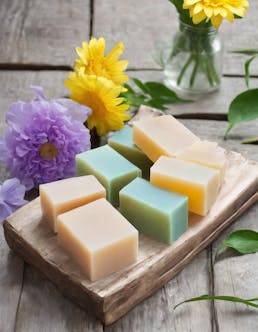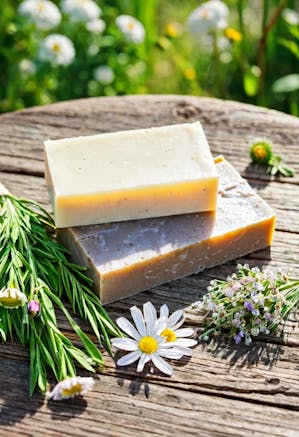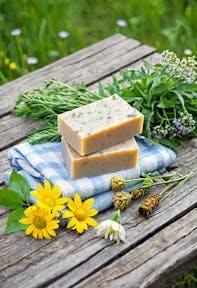The Art of Making Homemade Natural Soaps
Creating your own homemade natural soap is a rewarding and enjoyable craft that not only provides you with a useful product but also allows you to tailor the ingredients to suit your personal preferences and skin needs. Let's explore the process of making natural soap, how to infuse it with delightful scents, and the numerous benefits of DIY soap-making.
Why Make Your Own Soap?
Healthier for Your Skin: Commercial soaps often contain synthetic chemicals, preservatives, and artificial fragrances that can irritate the skin. Homemade natural soaps use pure, nourishing ingredients that are gentle and beneficial for your skin.
Customizable: You can customize the ingredients to suit your skin type, whether it's dry, oily, or sensitive. This customization extends to scents and additional properties, like exfoliation or moisturizing effects.
Eco-Friendly: Making your own soap reduces waste and allows you to choose environmentally friendly ingredients and packaging options.
Cost-Effective: While the initial investment in materials might seem high, in the long run, making your own soap is more economical than buying high-quality natural soaps.
Creative Outlet: Soap-making is a fun and creative hobby that can be shared with friends and family. It can also make for beautiful and personalized gifts.
Ingredients and Tools Needed
Basic Ingredients:
Lye (Sodium Hydroxide): Essential for the saponification process, which turns oils into soap.
Distilled Water: Avoid tap water as it can contain impurities.
Oils and Fats: Common choices include olive oil, coconut oil, palm oil, and shea butter. These oils provide different benefits to the soap.
Essential Oils: For fragrance and therapeutic properties. Examples include lavender, peppermint, eucalyptus, and tea tree oil.
Optional Additives: Natural colorants (like turmeric or beetroot powder), exfoliants (like oatmeal or poppy seeds), and moisturizers (like honey or aloe vera).
Tools:
Protective Gear: Gloves, goggles, and long sleeves to protect against lye.
Digital Scale: For precise measurements.
Thermometer: To monitor the temperature of your oils and lye solution.
Stick Blender: To mix the soap mixture thoroughly.
Soap Molds: Silicone molds work well for easy removal.
Heat-Resistant Containers: For mixing lye and oils.
Step-by-Step Soap-Making Process
Prepare Your Workspace: Ensure you have a clean, well-ventilated area. Gather all your ingredients and tools.
Measure and Mix Lye Solution:
Put on your protective gear.
Carefully measure the lye and distilled water.
Slowly add the lye to the water (never the other way around) and stir until dissolved. This mixture will heat up quickly, so set it aside to cool to about 100-110°F.
Heat and Combine Oils:
Measure your oils and heat them in a large pot until they reach about 100-110°F.
Ensure the lye solution and oils are at similar temperatures before combining.
Mix Lye Solution with Oils:
Slowly pour the lye solution into the oils while stirring.
Use a stick blender to mix until you reach "trace" – a stage where the mixture thickens and leaves a trail when drizzled on the surface.
Add Scents and Additives:
Once you reach trace, add your chosen essential oils and any optional additives.
Stir thoroughly to ensure everything is evenly distributed.
Pour into Molds:
Pour the soap mixture into your molds.
Tap the molds gently to remove air bubbles.
Cure the Soap:
Cover the molds with a towel to retain heat.
Let the soap sit for 24-48 hours to harden.
Once hardened, remove from molds and cut into bars if necessary.
Allow the soap to cure in a cool, dry place for 4-6 weeks. This curing process helps the soap to harden and improves its quality.
How to Make Your Soap Smell Good
Essential Oils: The key to a fragrant natural soap is high-quality essential oils. Popular options include lavender, citrus (like lemon or orange), peppermint, eucalyptus, and tea tree oil. Experiment with combinations to create unique scents.
Herbs and Spices: Adding dried herbs like rosemary, mint, or lavender buds not only enhances the fragrance but also adds texture. Spices like cinnamon or cloves can provide a warm, inviting scent.
Natural Extracts: Vanilla, almond, and coconut extracts can be used for a sweeter aroma.
Infused Oils: Infuse your base oils with herbs or flowers before soap-making. This adds a subtle, natural scent.
Benefits of Homemade Natural Soap
Natural Ingredients: No synthetic chemicals or artificial fragrances.
Skin-Friendly: Gentle and moisturizing, reducing the risk of irritation and dryness.
Customizable: Tailor to your skin type and fragrance preferences.
Eco-Conscious: Reduce waste and choose sustainable ingredients.
Cost-Effective: Save money by making high-quality soap at home.
Creative and Fun: Enjoy the process and the satisfaction of creating your own products.
Making homemade natural soap is a fulfilling and beneficial practice. By carefully selecting your ingredients and scents, you can create beautiful, fragrant soaps that are kind to your skin and the environment. So, gather your supplies, unleash your creativity, and start crafting your own luxurious bars of natural soap today!
Natural Extracts: Vanilla, almond, and coconut extracts can be used for a sweeter aroma.
Infused Oils: Infuse your base oils with herbs or flowers before soap-making. This adds a subtle, natural scent.
Benefits of Homemade Natural Soap
Natural Ingredients: No synthetic chemicals or artificial fragrances.
Skin-Friendly: Gentle and moisturizing, reducing the risk of irritation and dryness.
Customizable: Tailor to your skin type and fragrance preferences.
Eco-Conscious: Reduce waste and choose sustainable ingredients.
Cost-Effective: Save money by making high-quality soap at home.
Creative and Fun: Enjoy the process and the satisfaction of creating your own products.
Making homemade natural soap is a fulfilling and beneficial practice. By carefully selecting your ingredients and scents, you can create beautiful, fragrant soaps that are kind to your skin and the environment. So, gather your supplies, unleash your creativity, and start crafting your own luxurious bars of natural soap today!
Eco-Conscious: Reduce waste and choose sustainable ingredients.
Cost-Effective: Save money by making high-quality soap at home.
Creative and Fun: Enjoy the process and the satisfaction of creating your own products.
Making homemade natural soap is a fulfilling and beneficial practice. By carefully selecting your ingredients and scents, you can create beautiful, fragrant soaps that are kind to your skin and the environment. So, gather your supplies, unleash your creativity, and start crafting your own luxurious bars of natural soap today!


